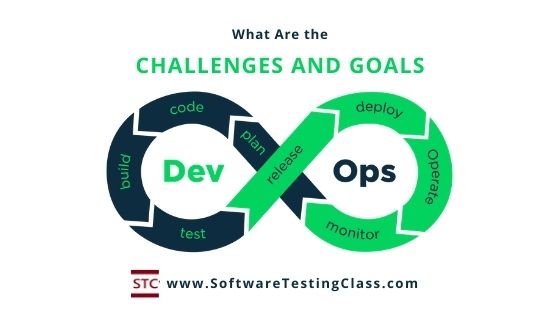In previous class we learned “What is DevOps? Where it has come from?”. Today we are understanding basic challenges and goals of DevOps solution.
DevOps is a union of Development and Operations. It accentuates for better collaboration among teams and close-fitting integration of tools that eventually lead to valued process mapping. But, it has been observed that over time, most of the organizations stumble when they try to implement DevOps, and many of them quit the journey midway. DevOps solution has great recognition among IT professionals across the globe, and today many organizations are already migrated to this solution, and many others are still in the planning phase as it discourages the manual interventions and works towards an automated synced world. But still, DevOps implementation continues to remain a big challenge for some organizations. Let us discuss those DevOps Goals and Challenges here.

Absence of a Standard DevOps Definition:
Many organizations are still not aware of the actual DevOps definition and what all are benefits of using it. Some organizations believe that DevOps masters other existing methodologies such as Scrum and Kanban, but it is not so. DevOps solution helps to improve the execution of such prevailing project methodologies. Therefore, the lack of proper understanding can end up in implementing new project methodologies risky where we can notice new problems that may cause issues in the implementation of a stable process throughout the organization.
Lack of Vision:
One needs to know a proper problem definition or solution. Otherwise, it will become impossible to have a vision. Once analysts in the organization get used to a process, they follow a specific path to manage things. Mitigate to stuck into a circle and try to break the ambiguous circle, and be more accessible to current scenarios to discover newer methods for the betterment of the overall solution. One should have a proper plan. Otherwise, it will become impossible to achieve a stable and profitable output. Lack of vision may end up adding more challenges to the project owners to create a clear-cut plan while deciding milestones, estimates, and deliverables, etc. Often it is risky for Analysts as there are only a few expert people in this domain, compared to the number of available tools in the market. It just adds confusion to the proper implementation of the solution that ultimately leads to an exponential increase in the risk factor associated with the DevOps solution.
Dearth of Tool Knowledge:
DevOps solution focuses on the ideologies of continuous integration, continuous deployment, continuous testing, and collaborative reporting. Still, many people prefer to continue their work with legacy tools as to get familiar with the functionalities of the latest tools is a challenging job, especially when you are dealing with the changes made to the architecture based on cloud and on-premises during the process. The lack of the latest tool knowledge can often lead organizations to make incorrect tool choices that may not align with the organization’s technical vision.
Absence of Tool Integration:
Continuous integration is one of the principles of DevOps methodology. We can make Build, Deploy, and Test work together in a continuous form only when the people in the organization has the proper knowledge of the integration of the tools. However, the root of the matter is that how to get the tools integrated? One tool integration with the other tool integration on one common platform is a big challenge.
Choice of Tools:
There are a large number and varieties of tools available in the market. Often, it is impossible to choose an appropriate tool due to the lack of proper knowledge about the technology behind that particular tool. Such a situation makes the idea of implementation of a DevOps solution for the organization extremely difficult.
Cultural Challenges:
The biggest challenge in adopting the DevOps culture is the disposal of legacy methods and the adaptation of new ones. As long as the outcome of using conventional mythologies is up to the mark, then the organization can continue to use them. On the contrary, if the result is off the mark, then the job demands many endless manual interventions that may hamper the overall rate of productivity. Further, it can lead to an adverse effect as the show continues.
Shortage of SMEs (Subject Matter Experts):
DevOps is a fresh methodology that has introduced to the market. Therefore, it is difficult to get the members with the adequate expertise in this field. As a result, there are many challenges which are intimidating for organizations to follow a streamlined set of guidelines. Also, in the absence of a DevOps development team with strong concepts or the lack of pre-defined KPIs can result in making the conditions dejected for employees.
Risk Analysis:
It is very difficult to upgrade aged methodologies to the new ones. Business analysts outlines many risks associated with the migration to the DevOps solution which is done based on certain calculations. Often, it is has noticed that it is very easy to start but tough to scale. Many troubles are faced by the workers to keep the pace steady. Therefore, adopting any new methodology involves risks to a great extent.
Isolated Teams (Development and Testing teams):
Both development and operations have their challenges in fitting into the DevOps model. The developers are constantly writing code to build a system, and testers on the other side perform a thorough analysis to ensure the overall product stability before the production delivery to the end customer. You can notice that there is a big gap between both teams as they work in silos. It can lead to a lack of transparency among both teams, and poor teamwork.
Conclusion: In this article, we discussed about the various challenges and goals in implementing DevOps solution in any organization.
Checkout all DevOps posts here:
- What is DevOps? Where it has come from?
- What Are the DevOps Goals and Challenges?
- Where Are You on the DevOps Continuum?
- What Are the Phases of DevOps Maturity?
- What The various Tools Used in DevOps?
- What are the values of DevOps Culture?
- What is the History and future of DevOps?
- What is DevOps? Where it has come from?
- Detailed Understand of Usability Testing: What? Why? & How?
- Mobile Testing Challenges and Solutions – Tutorial 3
- Internet Banking Application- Sample Test Cases And Best Practices
- The Challenges of Scaling Up Web Vulnerability Scanning
- How To Overcome Agile Testing Challenges!!
- GUI Testing In Software Testing
- ETL Process and Data Mart
- How to Overcome Automation Challenges Encountered While Doing Testing?
- Why Should Enterprises Embrace DevOps and Agile in Today’s Age of Digital Disruption?
